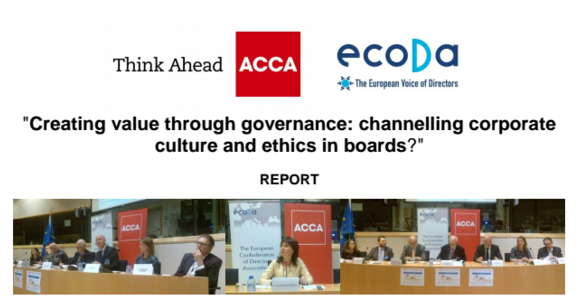In a session devoted to corporate governance and capital markets, participants debated how to foster sustainable business in Europe. The panel was composed of:
- Herman Mulder (True Price Foundation, Dutch NCP and TEEB Advisory Board)
- Marcello Palazzi (B Lab)
- Rosl Veltmeijer (Head of Research at Triodos Investment Management)
- Jeroen Veldman (Cass Business School)
- Paige Morrow (Frank Bold - moderator)
The discussion focused on how EU corporate governance can encourage greater respect for human rights and discourage practices which exacerbate the risk of human rights abuses.
Connection between Corporate Governance and Human Rights
The traditional understanding of the connection between corporate governance and human rights is to see the role of the board as overseeing human rights compliance as part its risk management role, or as part of its responsibility to create an ethical organisation. Paige Morrow noted that an increasing number of entrepreneurs and companies are going further to ask how they can make a positive contribution to the fulfilment of human rights and sustainable development by developing goods and services that are produced in safe and decent working conditions, serve bottom-of-the-pyramid consumers and/or give back to local communities. Marcello Palazzi pointed to Certified B Corporations like Warby Parker (an American eyeglass-maker which donates a pair of glasses for every pair that is sold) and Roshan (an Afghani telecommunications provider that facilitates access to education).
Where a company infringes human rights, it has a recognised responsibility to address the impacts. Herman Mulder, who is a member of the Dutch OECD National Contact Point, referenced the complaint against POSCO related to human rights violations in India. The complaint led to a joint agreement with Dutch Pension Fund ABP and its pension administrator APG, which had invested in POSCO, that all investors have a responsibility under the OECD Guidelines for Multinational Enterprises to exert influence where possible on companies they invest in to help prevent or mitigate possible adverse impacts of these companies’ operations. This obligation applies even when they are only minority shareholders in a company.
Policy Responses
The session also explored implications for business and policy-making to mitigate pressure on companies to focus on short-term financial results, which has been criticized for encouraging short-term thinking and the excessive externalization of costs. Jeroen Veldman noted that the pressure to generate short-term returns is a relatively recent phenomenon associated with the rise of shareholder primacy as a principle of business and law in Anglo-Saxon jurisdictions since the 1970s.
Speakers examined the relationship between companies’ long-term success and their ability to consider their purpose, respect for human rights and sustainability in their strategy and decision making. Rosl Veltmeijer, from Triodos, noted that the fiduciary duties of institutional investors allow for environmental, social and governance (ESG) factors to be considered but argued that this should be made explicitly clear.
A number of participants further noted the lack of policy coherence on human rights issues. For example, the OECD Principles for Corporate Governance recognise the importance of stakeholders but focus primarily on the role of shareholders and although they now reference the OECD Guidelines for Multinational Enterprises, more could be done to align the two instruments. Further information on the speakers can be found here: http://eu-roadmap.nl/wp-content/uploads/2016/05/Session-13_Speaker-Bio_Summary.pdf
Frank Bold published a backgrounder for the occasion analysing the current situation of corporate governance in Europe, first by identifying the problems and then by suggesting several alternatives to the current shareholder-centric approach to corporate governance and company law. The proposals are aimed at making European companies and the European economy more socially and environmentally sustainable, as well as more innovative.
The document is available online here: http://www.purposeofcorporation.org/corporate-governance-in-europe.pdf
The backgrounder advocates that building a responsible corporate governance framework is a cornerstone of sustainable companies and should therefore be central to the EU’s policies. Together, the articulation of long-term purpose and the introduction of a plurality of voices into corporate governance would allow a better alignment of corporate decision-making with the common good, and operate as a brake on the current systemic tendency towards short- termism. There need not be a binary choice between leaving corporate governance in the hands of boards alone or empowering shareholders. They may be counterbalanced by meaningful legal requirements of stakeholder participation in various aspects of corporate governance.




















